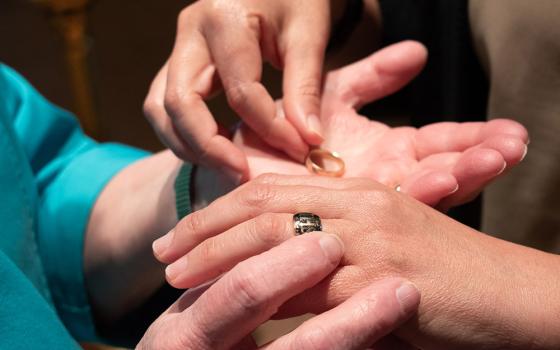
Health workers in New York City wheel a deceased person outside the Brooklyn Hospital Center during the coronavirus pandemic March 30, 2020. Dr. Deborah Birx, the White House coronavirus response coordinator, said the previous day that based on statistical models, more than 2,000 people could die each day in the United States in mid-April. (CNS/Reuters/Brendan McDermid)
As the COVID-19 pandemic touches nearly every corner of the globe, "there are many ethical considerations around resource allocation and the delivery of care for critically ill patients," said Mercy Sister Mary Haddad, president and CEO of the Catholic Health Association.
"Catholic health care is committed to the healing ministry of Jesus and upholding the inherent dignity of all who seek our care," she said in a March 27 statement. "We are also committed to accompanying and supporting patients through the end of their lives."
She warned against health care providers and facilities proposing "a universal, unilateral DNR" — a "do not resuscitate" policy — for patients who have tested positive for COVID-19.
"It is not morally appropriate" to proposed this kind of a policy, Haddad said.
"This eliminates clinical decision-making and erodes the patient-professional relationship. Universal DNRs also fail to take into account patient and hospital-specific information and undermine our duty to treat patients as unique individuals," she said.
Haddad said she recognizes that for some patients, especially those with underlying conditions, COVID-19 is often deadly and "even with supportive care," including ventilators, many critically ill patients with the disease "will die due to conditions such as multiorgan failure, sepsis, and/or cardiomyopathy."
As a result, she said, cardiopulmonary resuscitation, or CPR, "may be medically inappropriate for a significant portion of critically ill patients with COVID-19 and underlying comorbidities," and in these cases, she explained, "if it is shown that the burdens exceed the benefits, it is morally acceptable to withhold CPR."
This is in keeping with the "Ethical and Religious Directives for Catholic Health Care Services" of the U.S. Conference of Catholic Bishops, Haddad said.
"The clinical indication for decision-making about any intervention does not change for COVID-19 patients," she added. "The best standards and any state-specific regulations or laws on end-of-life decision-making are still applicable."
Across the country, a critical shortage of personal protective equipment for medical personnel who are treating patients with the highly contagious virus and a lack of equipment such as ventilators has prompted some U.S. hospitals to consider instituting a blanket DNR for COVID-19 patients despite their wishes or those of their family.
In general, a DNR is a legal order placed by a physician based on medical judgment and the patient's wishes and values. It indicates that a person does not want to receive CPR if his or her heart stops beating. Sometimes it also prevents other medical interventions.
Haddad said that in all cases where a DNR is being considered, "the patient and/or appropriate surrogate should be informed and provided the rationale."
"When such decisions are made, expert, compassionate communication with the patient and family is always necessary," she said. "Pastoral care should be consulted to provide spiritual support to all involved. Caregivers must also continue, or start, all comfort and palliative measures for the patient."
Hospitals also need to consider the health and safety of their staff, Haddad said. "Catholic health care's duty to care exists not only for the patient but also for the care team."
During this COVID-19 pandemic, hospital procedures should be "examined and modified, if possible, to reduce staff exposure to the virus," she continued, because "resuscitative measures often involve many members of the care team, use a large amount of personal protective equipment, and most importantly, have a high risk of aerosolizing bodily liquids."
Haddad concluded her statement by saying: "The Catholic health care ministry has a long tradition and history of caring for patients during public health emergencies. We draw on the strength and dedication of those who came before us to provide compassionate, loving care to patients suffering from this pandemic."
Advertisement





